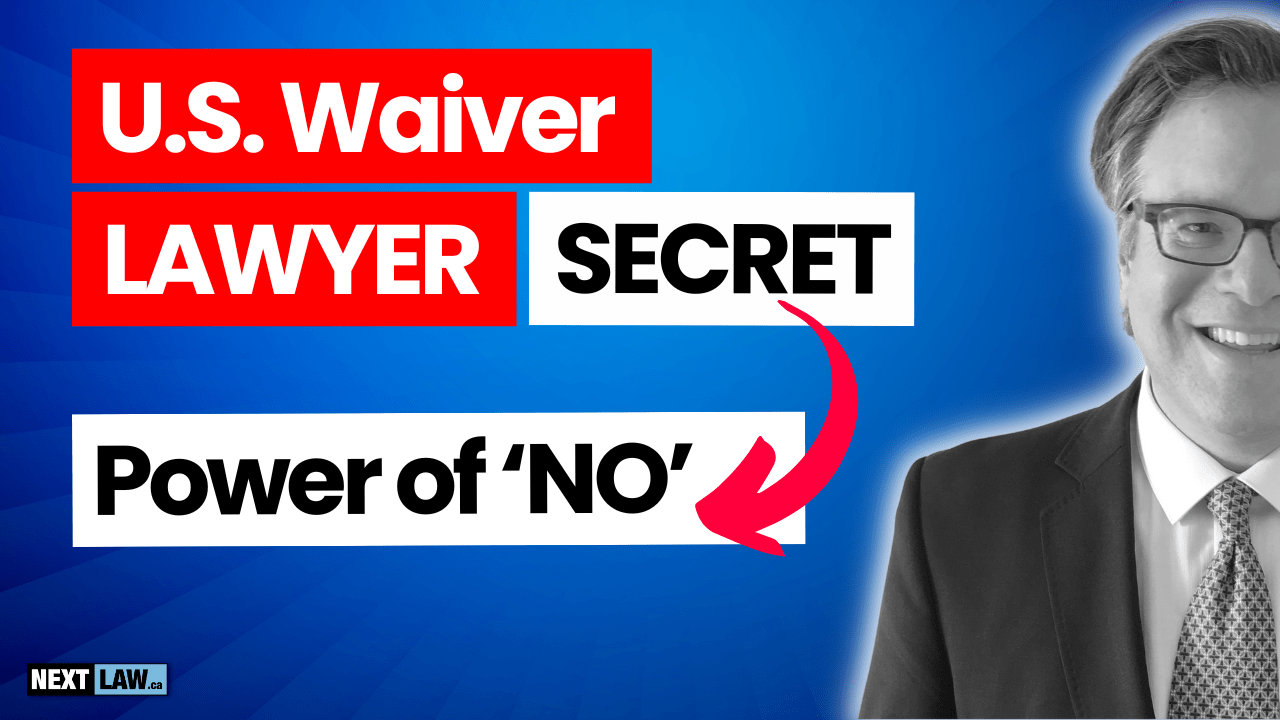As an experienced U.S. Waiver Lawyer, I’m about to reveal a little-known secret that might surprise you: sometimes, hearing “no” at the right time can be good. This counterintuitive truth about U.S. entry waivers could completely change your approach to applying for entry into the United States.
The Surprising Power of ‘No’
You might wonder, “How can hearing ‘No’ be good news?” The shocking truth is that sometimes, being told ‘No’ by a lawyer when considering a U.S. entry waiver application is the best thing to happen to you. A ‘No’ from a lawyer could mean the difference between travelling to the United States and never being able to enter the country again.
Let me explain with a real-life example that will clarify everything and reveal the power behind this secret.

A Cautionary Tale: Marijuana Use and U.S. Entry
Recently, I received a call from someone who was denied a U.S. entry waiver. They had no criminal record but admitted to smoking marijuana. Even though cannabis use may be legal in Canada, it’s illegal on a federal level in the United States. As a result, this person was deemed criminally inadmissible to enter the United States.
Here’s where the secret comes into play: This person applied for a waiver just a few months after being denied entry. This critical mistake can have devastating consequences, and it’s where the power of hearing ‘No’ becomes evident.
Understanding the U.S. Waiver Application Process
When you apply for a U.S. entry waiver, the U.S. Custom and Border Protection’s Admissibility Review Office only automatically permits you to enter. They need proof that you’ve been rehabilitated and are no longer the same person who committed the act that led to your inadmissibility.
Many people miss this crucial point but experienced U.S. Waiver Lawyers know that proper rehabilitation takes time and effort. It’s practically impossible to demonstrate meaningful change in just a few months. Rehabilitation often involves ongoing therapy, counseling, or other substantial life changes, and these processes can’t be rushed.
If you apply for a waiver too soon after being denied entry, you’re setting yourself up for failure. The Admissibility Review Office will likely see this as a red flag and question how you could possibly have reformed your behaviour in such a short time.
A premature application wastes your time and money and could harm your chances for future applications. This is where the power of ‘No’ becomes your secret weapon.
The Value of Expert Advice
If the person in our example had called me before they applied, I would have given them a firm ‘No.’ I would have explained their situation and that it was far too early to apply. That ‘No’ would have been the best advice they could have received.
By telling them ‘No,’ I would have saved them from a costly, premature application doomed to fail. I would have guided them towards taking the necessary time for genuine rehabilitation. In essence, that ‘No’ would have preserved their chance for a successful application in the future.
Conclusion: Embracing the Power of ‘No’
This is the power of hearing ‘No’ from a U.S. Waiver Lawyer—it can be the key to eventually hearing ‘Yes’ from U.S. Customs and Border Protection. It’s not about crushing your dreams of travel — it’s about protecting your future opportunities.
Are you considering applying for a U.S. Entry Waiver? Book a confidential meeting with Dan Joffe, U.S. Waiver Lawyer at NextLaw, to discuss the facts of your case. Your path to successful U.S. entry might start with understanding when to wait.
Why is hearing 'No' from a US waiver lawyer beneficial?
Hearing 'No' from a US waiver lawyer can prevent premature applications, saving you time and money while improving your chances of future success.
What should I do if I was recently denied entry to the US?
If you were recently denied entry, it's crucial to take the time for proper rehabilitation before reapplying for a US waiver. Consult with an experienced lawyer for guidance.


